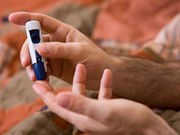Participation in diabetes self-management education game linked to sustained HbA1c reduction
THURSDAY, Aug. 10, 2017 (HealthDay News) — Sustained and meaningful improvements in hemoglobin A1c (HbA1c) are seen with participation in a diabetes self-management education (DSME) game, according to a study published online Aug. 8 in Diabetes Care.
B. Price Kerfoot, M.D., from the Veterans Affairs Boston Healthcare System, and colleagues randomized 456 patients on oral diabetes medications with HbA1c ≥58 mmol/mol to a DSME game (with a civics booklet) and a civics game (with a DSME booklet). Two questions were sent twice weekly via e-mail or mobile app as part of the six-month games. Modest financial rewards were provided for winning teams and individuals.
The researchers found that HbA1c reductions over 12 months were significantly greater for DSME game patients than civics game patients (−8 and −5 mmol/mol, respectively; P = 0.048). Among patients with baseline HbA1c >75 mmol/mol, HbA1c reductions were greater (−16 and −9 mmol/mol for DSME and civics game patients, respectively; P = 0.031).
“Among patients with poorly controlled diabetes, the DSME game reduced HbA1c by a magnitude comparable to starting a new diabetes medication,” the authors write. “Online games may be a scalable approach to improve outcomes among geographically dispersed patients with diabetes and other chronic diseases.”
One author disclosed owning Qstream Inc., which developed the automated game system.
Copyright © 2017 HealthDay. All rights reserved.








